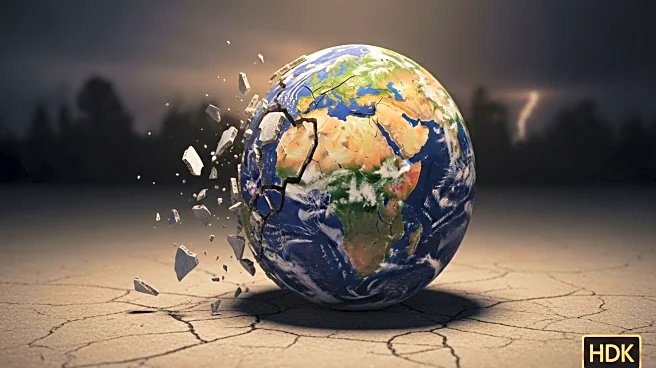What's Happening?
A 6.9-magnitude earthquake struck the central Philippines on September 30, 2025, causing significant damage and resulting in the deaths of at least 69 people. The quake hit the province of Cebu, particularly affecting the city of Bogo and surrounding areas. The earthquake occurred late at night, trapping residents in collapsed structures and cutting off power. Rescue operations are underway, with local authorities deploying troops, police, and volunteers to search for survivors. The Philippine government is considering seeking international assistance as they assess the damage.
Why It's Important?
The earthquake has had a devastating impact on the affected regions, disrupting daily life and causing widespread fear among residents. The Philippines, located on the Pacific 'Ring of Fire,' is prone to seismic activity, making this event a stark reminder of the country's vulnerability to natural disasters. The economic impact is significant, with damage to infrastructure and businesses, and the potential need for international aid could influence diplomatic relations. The disaster also highlights the importance of disaster preparedness and response capabilities in the region.
What's Next?
Authorities are continuing rescue operations and assessing the damage to determine the need for international aid. The government has declared a state of calamity in the hardest-hit areas to expedite relief efforts. President Ferdinand Marcos Jr. is expected to visit the affected regions to oversee the response. The Philippine Institute of Volcanology and Seismology has warned of potential aftershocks, and residents are advised to remain cautious. The focus will be on providing immediate relief to survivors and rebuilding the damaged infrastructure.
Beyond the Headlines
The earthquake has exposed vulnerabilities in the Philippines' infrastructure and emergency response systems. The event may prompt a reevaluation of building codes and disaster preparedness strategies. Additionally, the psychological impact on survivors, who have faced both a tropical storm and an earthquake in quick succession, is significant. Long-term recovery efforts will need to address both physical and mental health needs. The disaster also underscores the importance of international cooperation in disaster response and recovery.









